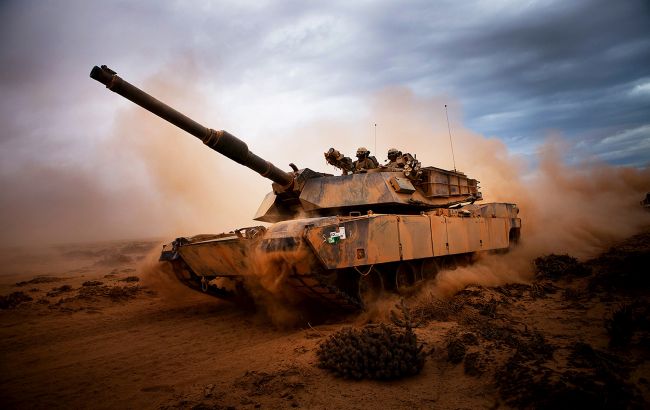US to supply Ukraine with depleted uranium rounds for Abrams tanks - WSJ
 Abrams tanks will be equipped with depleted uranium shells (GettyImages)
Abrams tanks will be equipped with depleted uranium shells (GettyImages)
The Biden administration is set to provide Ukraine with depleted uranium tank rounds after several weeks of internal debate on how to equip the Abrams tanks the US is supplying to Kyiv, The Wall Street Journal reports.
A high-ranking government official told the media that there seem to be no serious obstacles to the ammunition supply.
The Pentagon urged that the Abrams tanks, which the US is supplying to Ukraine, should be armed with depleted-uranium shells, which are regularly used by the US military and highly effective against Russian tanks. Fired at high speed, the shells are capable to penetrate the frontal armor of a Russian tank easily.
A military analyst at Rand Corporation and a former army artillery officer Scott Boston said that the round hits like a freight train, as it directs a large amount of kinetic energy to a specific point of the enemy armor mass.
The proposition was discussed at the White House, where some officials expressed concern that sending shells could expose Washington to criticism for supplying weapons that could pose a risk to health and the environment.
Debates on depleted uranium tank rounds
The debates on shell supply come as Ukraine is conducting a large counteroffensive to reclaim territory seized by Russian forces. President of Ukraine Volodymyr Zelenskyy said that this long-awaited operation had begun.
Senior officials in the Biden administration said that the US goal is to let Ukraine make maximum progress on the battlefield and to put Kyiv in a strong position in the peace negotiations. However, within the Biden administration, there was no consensus on what is the best way to support Ukrainian forces, including whether to supply cluster munitions.
Political support for Ukraine on Capitol Hill remains strong, but some lawmakers say support may start to wane if Kyiv's counteroffensive is not successful, and that the White House needs to further support the country's current requests for arms supplies.
Background on ammunition supplies
The saga with the ammunition started in January when the White House agreed to provide Ukraine with 31 Abrams tanks as part of a broader agreement, according to which Berlin and other European capitals would agree to send German-made Leopard-2 tanks.
Initially, the US planned to purchase new M1A2 Abrams tanks. However, to shorten the delivery terms, the administration decided to refurbish the M1A1 tanks that are already in the American armament and provide them to Ukraine.
Ukrainian military personnel are currently being trained in Germany in the operation and maintenance of the Abrams, which will be delivered in the fall.
Meanwhile, the issue of arming the tanks remained. While the US was considering its options, the UK provided Ukraine with Challenger tanks along with armor-piercing shells made from depleted uranium for their shooting.
Although depleted uranium is a byproduct of the uranium enrichment process, it does not cause a nuclear reaction. The UN Environment Program stated in last year's report that the "chemical toxicity" of the metal poses the greatest potential danger and can cause skin irritation, kidney failure, and increase the risk of cancer.
However, Russian President Vladimir Putin has accused the UK of spreading "weapons with a nuclear component," UK claims that Moscow is spreading disinformation.
John Kirby, the US National Security Council Coordinator for Strategic Communications, said in March that Russia's arguments are insincere, and what worries Moscow most is the increased threat to its tanks. "This type of ammunition is quite common," he said, adding that research shows it is not a radioactive threat. But at that time, the US had not supplied Ukraine with any depleted uranium shells.
Other weapons supplies
The White House is still discussing whether to provide Ukraine with other weapons, including cluster munitions, which Kyiv has requested.
Some Pentagon representatives support providing Ukrainian forces with cluster munitions, known as dual-purpose improved conventional munitions, to help them withstand Russian forces. NATO's Supreme Allied Commander Europe General Christopher Cavoli told Congress that such a weapon could be "very effective" against concentrated Russian troops and equipment.
The US National Security Council and Department of State officials are opposing the supplying of cluster munitions. Human rights activists and some allied countries have expressed concern that unexploded ordnance may cause civilian casualties long after the conflict has ended.
Ukraine also requests long-range American-made missiles, known as ATACMS. While President Biden stated in May that this option "is still on the table," US officials say such a move is not inevitable.
But now, the dispatch of depleted uranium shells is expected.
Tank versus tank battles do not seem to be very common in this war, said Boston, a Rand analyst, adding that if it does happen, the US would like Ukrainians to win.
Earlier, the transfer of depleted uranium shells was announced in the UK. They sent shells along with a squadron of main battle tanks Challenger 2. At that time, the Pentagon said that the United States did not plan to follow the UK's example and provide Ukraine with depleted uranium shells.

